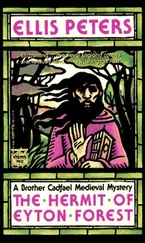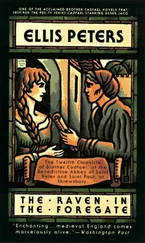“My lord bishop, here is Deacon Mark, of the household of the bishop of Lichfield and Coventry, asking audience.”
“The messenger of my colleague of Lichfield is very welcome,” said the formal voice from the high table.
Mark made his brief address in a clear voice, his eyes fixed on the long, narrow countenance that confronted him. Straight, wiry steel-grey hair about a domed tonsure, a long, thin blade of a nose flaring into wide nostrils, and a proud, tightlipped mouth that wore its formal smile somewhat unnervingly for lack of practice.
“My lord, Bishop Roger de Clinton bids me greet you reverently in his name, as his brother in Christ and his neighbour in the service of the Church, and wishes you long and fruitful endeavour in the diocese of Saint Asaph. And by my hand he sends you in all brotherly love this letter, and this casket, and begs you accept them in kindness.”
All of which Cadfael took up, after the briefest of pauses for effect, and turned into ringing Welsh that brought an approving stir and murmur from his fellow-countrymen among the assembly.
The bishop had risen from his seat, and made his way round the high table to approach the edge of the dais. Mark went to meet him, and bent his knee to present letter and casket into the large, muscular hands that reached down to receive them.
“We accept our brother’s kindness with joy,” said Bishop Gilbert with considered and gratified grace, for the secular power of Gwynedd was there within earshot, and missing nothing that passed. “And we welcome his messengers no less gladly. Rise, Brother, and make one more honoured guest at our table. And your comrade also. It was considerate indeed of Bishop de Clinton to send a Welsh speaker with you into a Welsh community.”
Cadfael stood well back, and followed only at a distance on to the dais. Let Mark have all the notice and the attention, and be led to a place of honour next to Hywel ab Owain, who sat at the bishop’s left. Was that Canon Meirion’s doing, the bishop’s own decision to make the most of the visit, or had Hywel had a hand in it? He might well be interested in learning more about what other cathedral chapters thought of the resurrection of Saint Kentigern’s throne, and its bestowal on an alien prelate. And probing from him might be expected to find a more guileless response than if it came from his formidable father, and produce a more innocent and lavish crop. A first occasion, it might be, for Mark to say little and listen much.
Cadfael’s own allotted place was much further from the princely centre, near the end of the table, but it gave him an excellent view of all the faces ranged along the seats of honour. On the bishop’s right sat Owain Gwynedd, a big man every way, in body, in breadth of mind, in ability, very tall, exceeding by a head the average of his own people, and flaxen-fair by contrast with their darkness, for his grandmother had been a princess of the Danish kingdom of Dublin, more Norse than Irish, Ragnhild, a granddaughter of King Sitric Silk-Beard, and his mother Angharad had been noted for her golden hair among the dark women of Deheubarth. On the bishop’s left Hywel ab Owain sat at ease, his face turned towards Brother Mark in amiable welcome. The likeness was clear to be seen, though the son was of a darker colouring, and had not the height of the sire. It struck Cadfael as ironic that one so plainly signed with his father’s image should be regarded by the cleric who sat beside him as illegitimate, for he had been born before Owain’s marriage, and his mother, too, was an Irishwoman. To the Welsh a son acknowledged was as much a son as those born in marriage, and Hywel on reaching manhood had been set up honourably in South Ceredigion, and now, after his uncle’s fall, possessed the whole of it. And very well capable, by his showing so far, of holding on to his own. There were three or four more Welshmen of Owain’s party, all arranged turn for turn with Gilbert’s canons and chaplains, secular and clerical perforce rubbing shoulders and exchanging possibly wary conversation, though now they had the open casket and its filigree silver cross as a safe topic, for Gilbert had opened it and set it on the board before him to be admired, and laid de Clinton’s scroll beside it, doubtless to await a ceremonial reading aloud when the meal was drawing to its close.
Meantime, mead and wine were oiling the wheels of diplomacy, and by the rising babel of voices successfully. And Cadfael had better turn his attention to his own part in this social gathering, and begin to do his duty by his neighbours.
On his right hand he had a middle-aged cleric, surely a canon of the cathedral, well-fleshed and portly, but with a countenance of such uncompromising rectitude that Cadfael judged he might well be that Morgant whose future errand it was to see that both father and daughter conducted themselves unexceptionably on the journey to dispose of Heledd to a husband. Just such a thin, fastidious nose seemed suitable to the task, and just such chill, sharp eyes. But his voice when he spoke, and his manner to the guest, were gracious enough. In every situation he would be equal to events, and strike the becoming note, but he did not look as if he would be easy on shortcomings in others.
On Cadfael’s left sat a young man of the prince’s party, of the true Welsh build, sturdy and compact, very trim in his dress, and dark of hair and eye. A very black, intense eye, that focussed on distance, and looked through what lay before his gaze, men and objects alike, rather than at them. Only when he looked along the high table, to where Owain and Hywel sat, did the range of his vision shorten, fix and grow warm in recognition and acknowledgement, and the set of his long lips soften almost into smiling. One devoted follower at least the princes of Gwynedd possessed. Cadfael observed the young man sidewise, with discretion, for he was worth study, very comely in his black and brooding fashion, and tended to a contained and private silence. When he did speak, in courtesy to the new guest, his voice was quiet but resonant, and moved in cadences that seemed to Cadfael to belong elsewhere than in Gwynedd. But the most significant thing about his person did not reveal itself for some time, since he ate and drank little, and used only the right hand that lay easy on the board under Cadfael’s eyes. Only when he turned directly towards his neighbour, and rested his left elbow on the edge of the table, did it appear that the left forearm terminated only a few inches below the joint, and a fine linen cloth was drawn over the stump like a glove, and secured by a thin silver bracelet.
It was impossible not to stare, the revelation came so unexpectedly; but Cadfael withdrew his gaze at once, and forbore from any comment, though he could not resist studying the mutilation covertly when he thought himself unobserved. But his neighbour had lived with his loss long enough to accustom himself to its effect on others.
“You may ask, Brother,” he said, with a wry smile. “I am not ashamed to own where I left it. It was my better hand once, though I could use both, and can still make shift with the one I have left.”
Since curiosity was understood and expected of him, Cadfael made no secret of it, though he was already hazarding a guess at the possible answers. For this young man was almost certainly from South Wales, far from his customary kin here in Gwynedd.
“I am in no doubt,” he said cautiously, “that wherever you may have left it, the occasion did you nothing but honour. But if you are minded to tell me, you should know that I have carried arms in my time, and given and taken injury in the field. Where you admit me, I can follow you, and not as a stranger.”
“I thought,” said the young man, turning black, brilliant eyes on him appraisingly, “you had not altogether the monastic look about you. Follow, then, and welcome. I left my arm lying over my lord’s body, the sword still in my hand.”
Читать дальше












